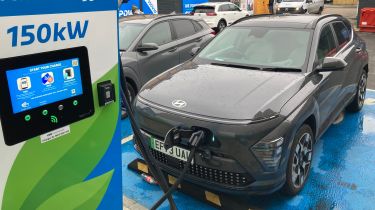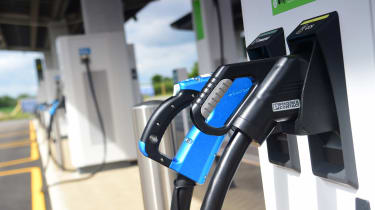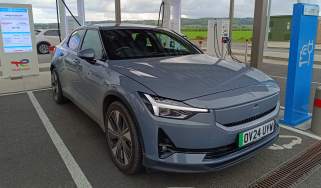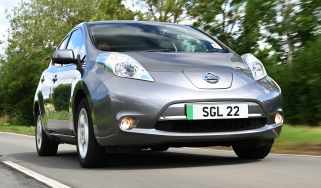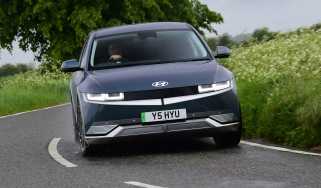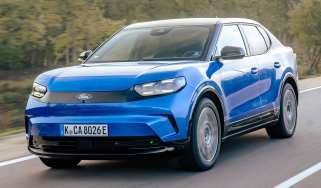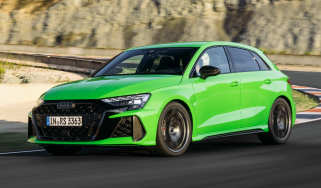What is fast charging? What is rapid charging? Electric car charger types explained
Here’s all you need to know about electric car charger types and speeds in the UK
If you’re considering an electric car but are confused by the array of charger types available, don’t worry – it’s not as complicated as it may seem at first. Most motorists are used to the simplicity of selecting the right fuel pump and filling the tank; charging is a little bit more involved but quickly becomes second nature for electric car owners.
In simple terms, there are slow, fast and rapid chargers available, each with different connectors. All will top up your car’s battery but the speed at which they charge differs.
How fast, rapid and ultra-rapid charging works
Electric vehicle batteries have to be charged with direct current (DC). When charging from an alternating current (AC) source – such as a domestic socket or public fast charger – electric vehicles and plug-in hybrids use a built-in converter to turn AC to DC.
All fast chargers – rated between 7kW and 22kW – work this way. They are typically useful for charging an electric car over a few hours. Charging at these slower speeds can also help prolong the good health of an electric car’s battery.
Fast charging at these speeds almost always requires the use of a dedicated Type 2 charging cable. Most electric cars come with one of these cables as standard.
A charging cable with a three-pin plug for connecting to domestic electricity supplies is also often standard with EVs, although sometimes it’s an optional extra. These are usually the slowest of all charging options.
Rapid chargers represent the next step up, and there are two kinds. Rapid AC charging just uses more power (up to 43kW) but is much less common, while rapid DC chargers supply direct current straight to the car at up to 50kW at least.
These options are great for topping up during a shorter stop, perhaps while you shop or visit a service station. Rapid chargers always have their cables attached to the charging unit itself – there’s no need to plug in your own.
While 50kW DC chargers are still the most common rapid chargers in the UK, 100kW and 150kW DC chargers are becoming more prevalent – often referred to as ultra-rapid chargers.
The Tesla Supercharger network features ultra-rapid chargers of 120–150kW depending on location, while the fastest ultra-rapid chargers in the UK for now are 350kW. Only a handful are available, but numbers should increase in the coming years.
Can all electric cars use these chargers?
It is important to note that peak charge speed is ultimately dictated by an electric car’s specification. Until recently the most common peak was 50kW, but this has increased to 100kW and beyond in recent times as technology has improved.
Put simply, an EV will only ever charge up to its listed maximum charging speed limit, regardless of the potential power output of the charger it’s plugged into.
The most common connector for fast chargers is Type 2, while all rapid AC chargers use a Type 2 connection. The majority of electric cars accept these connectors thanks to EU legislation.
DC charging is most often delivered via a CCS connector. This applies to the vast majority of electric cars but some – the Nissan Leaf, for example – use CHAdeMO for this. Many electric DC charging stations have a connector for both methods.
If you are unsure about your electric car’s peak charging speed and connector types, don’t forget to check the manual.
Electric car charger types
Below we look at the different types of electric car charger connectors in the UK. Increasingly, it’s Type 2 for fast charging and CCS for rapid charging but it’s possible that you could encounter the others, too.
Type 1
This is a single-phase plug with a maximum charge of 7.4kW. It’s found mostly on mainland Europe, but some cars have a Type 1 connector. Some home and public chargers have Type 1 connectors, too, but no public charging station only serves Type 1 cables: if you have a public charging cable, you should be able to charge anywhere.
Type 2
In 2014, the European Commission ruled that all public charging stations must feature a Type 2 connector or connecting capability. This is why new electric vehicles and plug-in vehicles sold in the UK feature Type 2 sockets and often come with a Type 2 cable included. Most of the home chargers that you can buy today also feature a Type 2 connector.
Type 2 connectors usually handle charge speeds of 7kW to 22kW, as well as some faster 48kW AC outputs.
CCS
CCS stands for Combined Charging System and is a rapid DC charging connector, favoured by European makers. It’s available only in public charging stations with a rapid DC charging capacity of 50kWh and above. If you want to use one, your car must have a CCS socket.
CHAdeMO
This is the Japanese counterpart of CCS. It also works on 50kW power and cars need a specific socket to use the public chargers. But, all stations with CCS also supply CHAdeMO.
Commando
This style isn’t very popular, as it featured mainly on low-selling electric vehicles. Some public charging stations do feature this connector, but they are rare.
Frequently Asked Questions
In short, yes. Networks charge different fees, but you will generally pay more for a rapid charger than a fast charger.
Searching for a zero-emission bargain? These are the cheapest electric cars on sale...
Your electric car questions answered
- Should i buy an electric car?
- What’s the best way to buy an electric car?
- Is a hybrid, plug-in hybrid or electric car right for me?
- Should i buy a used electric car?
- Can i get a plug-in car grant?
- How is electric car range calculated?
- How much do electric cars cost to charge?
- How much do electric cars cost to run?
- How long do electric car batteries last?
- What happens to old electric car batteries?
- Should i get a heat pump on my electric car?
- What are fast charging and rapid charging?
- Should i get a home electric car charger?
- Can i tow with an electric car?
- Is wireless electric car charging the future?
- What’s the history of the electric car?
- What’s the future of the electric car?

